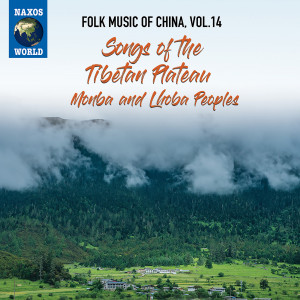 This is the 14th of a planned 20 volumes of folk songs from across the immensely varied regions of China, and the second covering the music of the Tibetan Plateau. The previous release, Vol. 14, covered songs from the Haixi Mongol and Tibetan Autonomous Prefecture and Yushu County in Qinghai Province, and the Linzhi Prefecture in Tibet Autonomous Region. This one has songs from the Monba and Lhoba peoples, ethnic groups who live around the border with India. Both are farming, herding and hunting peoples traditionally, with only small populations of about 10,000 of the Monba and about one-third as many of the Lhoba people.
This is the 14th of a planned 20 volumes of folk songs from across the immensely varied regions of China, and the second covering the music of the Tibetan Plateau. The previous release, Vol. 14, covered songs from the Haixi Mongol and Tibetan Autonomous Prefecture and Yushu County in Qinghai Province, and the Linzhi Prefecture in Tibet Autonomous Region. This one has songs from the Monba and Lhoba peoples, ethnic groups who live around the border with India. Both are farming, herding and hunting peoples traditionally, with only small populations of about 10,000 of the Monba and about one-third as many of the Lhoba people.
The 16 selections here include nine from Monba and seven Lhoba. Although both groups use various types of flutes to accompany their folk songs, and the Monba use a bamboo frame drum and the Lhoba also use a jaw harp, all of the selections on this recording are unaccompanied, which is a little frustrating.
The Monba selections are heavy on love songs of the Xie style, which goes back all the way to the 6th Dalai Lama Tsangyang Gyatso in the late 17th and early 18th centuries. The longest track on this disc at nearly six minutes is a Monba song called simply “A Love Song,” delivered in a highly emotive style. Several of the Monba songs feature a vocal dip at the end of each verse or stanza, which sounds very much like what you often hear in Appalachian singing. “Song of Joyful Gathering,” the second track, is especially nice, delivered by a singer with a rich, expressive alto voice.
Many of the Lhoba songs feature vocalists with deeper voices, in a language that seems more guttural than the Monba. All but two of them are of a style called “Jia yi jia,” a solemn ancient kind of tune usually performed as part of various rituals. They have a repeated refrain that gives the impression of a call-and-response type song, a short verse followed by the “Jia yi jia,” phrase that to me sounds something like “yatn-yam” in the women’s versions, “yadin-ja” or “jadin-jam” in the men’s. It’s quite catchy, and you can hear how it would fit well within a ritual situation.
All of the Lhoba songs are solo except the final “Love Song,” which has a man and woman singing more or less in unison on the chorus, although they seem to be singing totally different things during the verses.
Sample tracks and learn more on the Naxos World website.
(Naxos World, 2021)
